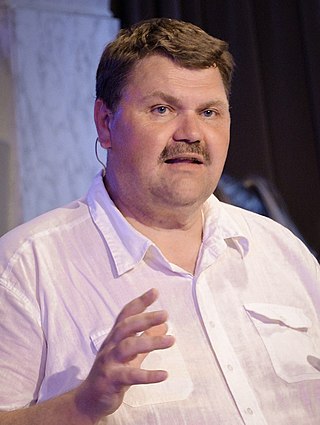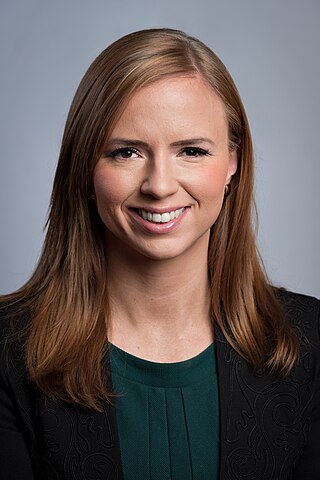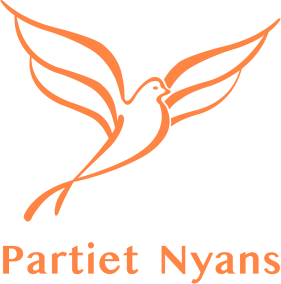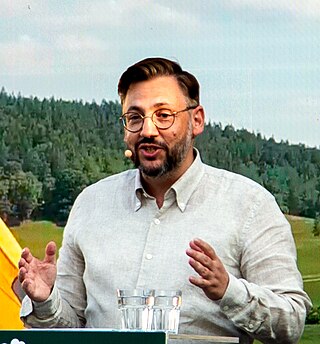
The Sweden Democrats is a nationalist and right-wing populist political party in Sweden founded in 1988. As of 2024, it is the largest member of Sweden's right-wing bloc and the second-largest party in the Riksdag. It provides confidence and supply to the centre-right ruling coalition. Within the European Union, the party is a member of the European Conservatives and Reformists Party.

The Moderate Party, commonly referred to as the Moderates, is a liberal-conservative political party in Sweden. The party generally supports tax cuts, the free market, civil liberties and economic liberalism. Globally, it is a full member of the International Democracy Union and the European People's Party.

The Christian Democrats is a Christian democratic political party in Sweden founded in March 1964. It first entered parliament in 1985, through electoral cooperation with the Centre Party; in 1991, the party won seats on its own. The party leader since 25 April 2015 has been Ebba Busch.
The Green Party, commonly referred to as Miljöpartiet in Swedish, is a political party in Sweden based on green politics.

Per Jimmie Åkesson is a Swedish politician and author, serving as leader of the Sweden Democrats since 2005. He has been a member of the Riksdag (SD) for Jönköping County since 2010. He previously served as leader of the Sweden Democratic Youth from 2000 until 2005.
Sören Axel Wibe was a Swedish economist and eurosceptic politician, born in Östersund. He was a Social Democratic Member of the European Parliament (MEP) 1995–1999, member of the Riksdag 2002–2006, and party leader of the June List 2008-2010. In January 2009 he was elected President of the EUDemocrats - Alliance for a Europe of Democracies, a eurorealist European political party with members from 15 European countries.
Libertas Sweden is a political party in Sweden. It intended to contend the 2009 European Parliament elections under a common banner with Declan Ganley's Libertas.eu.

European Parliament elections in Sweden took place on 25 May 2014. At the election, twenty Members of the European Parliament (MEPs) were from the Swedish constituency. In the election, voters choose members of registered Swedish parties whose elected members then form political groups in the European Parliament, together with members of parties from other Member States with the same political affiliation.

The Left Party is a socialist political party in Sweden. On economic issues, the party opposes privatizations and advocates for increased public expenditures. In foreign policy, the party is Eurosceptic, being critical of the European Union and opposing Sweden’s entry into the eurozone. It attempted to get Sweden to join the Non-Aligned Movement in 1980, but did not succeed. The party is eco-socialist, and supports republicanism. It stands on the left-wing of the political spectrum.

Kristina Eva Martina Winberg is a Swedish former politician who was a Member of the European Parliament (MEP) representing the Sweden Democrats, part of the European Conservatives and Reformists. She was elected to the European Parliament in the 2014 European Parliament election in Sweden. In 2019, she was excluded from the Sweden Democrats.

Kent Peter Lundgren is a Swedish politician who was Member of the European Parliament (MEP), from Sweden, from 2014 to 2024. He was a member of the Sweden Democrats, part of European Conservatives and Reformists.

Sara Magdalena Skyttedal is a Swedish politician previously of the Christian Democrats party. She was Member of the European Parliament from 2019 to 2024.
Citizens' Coalition, officially known as Bourgeois Future until 2017, is a right-wing political party in Sweden that was founded in 2014. The party considers itself liberal-conservative and green conservative, while observers described it as a right-wing party critical of immigration and conservative.
Alternative for Sweden is a far-right political party in Sweden. It was founded in March 2018 by Gustav Kasselstrand and William Hahne, along with other members of the Sweden Democratic Youth, who were collectively expelled from the Sweden Democrats in 2015. It advocates the forced remigration of immigrants and Sweden's withdrawal from the European Union.

European Parliament elections were held in Sweden in May 2019 to elect the country's twenty members of the European Parliament.
The Independent Rural Party is a Swedish agrarian and Eurosceptic political party founded in 2010 which focuses on politics for rural areas.

The 2024 European Parliament election in Sweden were held on 9 June 2024 as part of the 2024 European Parliament election. This was the seventh European Parliament election held in Sweden, and the first to take place after Brexit.

The Nuance Party is an Islamist and Muslim minority rights party in Sweden, founded in 2019. The party has been criticized due to defending former ISIS members.
In the run-up to the next Swedish general election, various organisations carry out opinion polling to gauge voting intention in Sweden. The date range for these opinion polls are from the 2022 Swedish general election, held on 11 September, to the present day. The next election is scheduled for 13 September 2026, but a snap election may be held earlier.

Muharrem Daniel Demirok is a Swedish politician who has been the leader of the Centre Party since 2 February 2023. Additionally, Demirok has been a member of parliament since September 2022.













